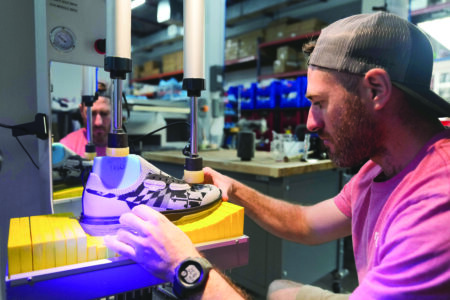Community colleges expect enrollment surge from COVID-19
LANSING — Thousands of coronavirus front-line workers are expected to enroll in Michigan community colleges under a new program that makes it free for them.
“When you tell people the word free, it changes their behavior as the word free is very motivating,” said Michael Hansen, president of Michigan Community College Association.
Some 65,000 people signed up for the program within two to three weeks of announcing it on April 29, Hansen said. “We are expecting a huge flow of new students next semester.”
That’s a welcome surge of potential students for colleges that saw a 5% to 10% enrollment decline his fall, he said.
How many of the applicants to the Futures for Frontliners program will qualify is uncertain.
It provides free tuition toward earning a technical certificate or associate degree to essential workers who don’t have a college degree. That includes workers like the ones staffing hospitals and nursing homes, stocking the shelves at grocery stores, providing child care to critical infrastructure workers, protecting public safety, picking up trash or delivering supplies.
The state invested $24 million into the program from the governor’s emergency relief fund, which comes from the federal Coronavirus Aid, Relief, and Economic Security Act known as CARES.
The program was inspired by the federal government’s support of soldiers returning from World War II by providing educational opportunities, according to Gov. Gretchen Whitmer’s office. It supports Michigan’s goal of increasing working-age adults with a skill certificate or college degree from 45% today to 60% by 2030.
Whitmer recently proclaimed October as College Month.
The state had expected only 10,000 to 15,000 applications, but it has already received 65,000 applications, Hansen said. The deadline is Dec. 31.
Potential students can start applying here.
“Urban area residents are more informed about this program. But the state government is targeting rural Michigan residents as they haven’t informed about the program,” Hansen said.
Community colleges are ready and used to adapting to fluctuating enrollment, Hansen said.
“We have capacity and infrastructure to teach all new students as we work with adjunct faculty and we can hire faculty members if needed,” he said.
While the pool of eligible potential students is limited, those who may not qualify may be eligible for the Michigan Reconnect program, another tuition-free pathway for adults to earn an associate degree.
Traverse City’s Northwestern Michigan College expected a 15% drop in enrollment this fall semester because of the pandemic, but it decreased to only 8% as more students transferred in from other colleges to pay less for online education, said Cathryn Claerhout, the school’s admissions director.
Part of the reason for the drop is that fewer Michigan students graduated from high school, she said. This program will help make up for that decline.
“There are 166,000 fewer (high school) seniors graduated this year, and it’s the largest decline in a decade,” Claerhout said. “That’s why all of the community colleges saw a decrease in enrollment.”
State officials must first verify potential students are essential workers, and then the colleges check their eligibility for program requirements.
“Our college has received over 1,000 applicants, who applied through the Futures for Fronliners program,” she said. “We are still working with data, so we don’t know yet what portion of these students will be approved to enroll in next semester.”
The Michigan College Access Network has helped 450 prospective students enroll in community colleges via the Futures for Frontliners program, said Jenny McArdle, the director of that organization’s service strategy. The nonprofit network advocates for college education and has 30 advisers across the state who can help students approved as eligible.
“We have set up a hotline number to give additional information about the program to help students to enroll,” McArdle said. Only applicants who were approved by the state government to enroll via the Futures for Frontliners program will receive a hotline phone number.
“We saw an increase in phone calls starting at the end of September as the approval by the government to the programs takes two weeks,” she said. “And we feel that our hotline will be busy until the end of the year.”





